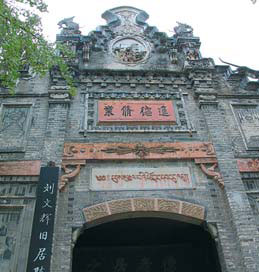Surprising discovery
Updated: 2012-04-19 10:35
By Wang Kaihao (China Daily)
|
|||||||||||
 |
|
The gate of Liu Wenhui's mansion, which was a gift from his older brother Liu Wencai. Wang Kaihao / China Daily |
Liu manor is synonymous with Anren town in Dayi county, on the western outskirts of Sichuan's provincial capital Chengdu.
Built circa 1932, the manor spreads over 70,000 square meters and houses five mansions, which belonged to infamous landlord Liu Wencai and his family.
Liu (1887-1949) is often described as "a despot", who had great political influence in the 1930s and '40s and was said to be cruel to his employees and local farmers.
To find out more, I go to Anren to see the manor.
I am wowed by the sheer size of the manor, which demonstrates Liu's wealth. If I don't have a tourist guide with me, I would get lost in the maze-like enclave, where one mansion looks almost identical to the next.
Typical of the architectural characteristics of the houses in western Sichuan during those days, the designs of Liu's mansions are simple, the walls are gray - unlike architecture in bigger cities such as Beijing.
Liu's houses used building materials commonly available during his time, including stones, bricks and wood.
But in spite of its generally simple style, I'm charmed by some of the compound's details. For instance, the eaves, walls and roofs are decorated with paintings, carvings and sculptures, most of which depict countryside life, natural landscapes and auspicious animals, which are believed to bring fortune.
Legend has it that Liu had a water dungeon in his residence, where he punished his employees and local residents. But my tourist guide insists the legend is untrue.
"Some historical records exaggerate the facts," he says.
I also notice the captions introducing the different rooms are very brief. I presume it is because of the controversy he aroused even after his death in 1949.
During the "cultural revolution" (1966-76), Liu's legacy became the target of mass denunciations. Yet, many of Liu's devilries have been proven to have been fabricated.
It's difficult for me to find out what Liu was really like during the short tour, but I find him to be rather generous - at least to his younger brother, Liu Wenhui (1894-1976), who was Sichuan's governor in the 1930s.
Liu Wencai apparently gave his brother Wenhui a mansion, just 300 meters away from his own.
The architecture is generally similar but the younger Liu appeared to be interested in Western culture, judging from the tennis court near the entrance to his house.
The Liu brothers had different destinies. While the senior Liu had a negative reputation, Wenhui became the country's forestry minister after the founding of New China in 1949. He was known to have contributed much to local communities and the country.
The Liu's territory is not just limited to the compounds of the manor. Many of the mansions lining the main thoroughfare of the town are former residences of Liu's other family members. They include three army corps commanders, nine brigadiers and 18 colonels.
These smaller houses, once heavily guarded, have become shops, teahouses and restaurants that have preserved the original flavor of the architecture.
One of the hospitable shop owners who speaks Mandarin with a Sichuan accent, beckons me as I walk past.
I order a bowl of rice noodles and a dish of boiled duck blood for about 20 yuan ($3).
While sipping the soup, I think to myself, no matter how this town has changed since the days of Liu Wencai and his brother, at least, this Sichuan delicacy tastes the same.
wangkaihao@chinadaily.com.cn
Related Stories
Sichuan Cuisine Museum 2012-04-12 16:04
Step Into My Kitchen: A Talk With A Sichuan Chef 2012-04-12 14:13
Spring scenery in Mianzhu, Sichuan 2012-03-28 17:31
Sichuan cuisine 2012-03-27 17:00
Sichuan bamboo fungus 2012-03-14 08:43
Today's Top News
President Xi confident in recovery from quake
H7N9 update: 104 cases, 21 deaths
Telecom workers restore links
Coal mine blast kills 18 in Jilin
Intl scholarship puts China on the map
More bird flu patients discharged
Gold loses sheen, but still a safe bet
US 'turns blind eye to human rights'
Hot Topics
Lunar probe , China growth forecasts, Emission rules get tougher, China seen through 'colored lens', International board,
Editor's Picks

|

|

|

|

|

|





